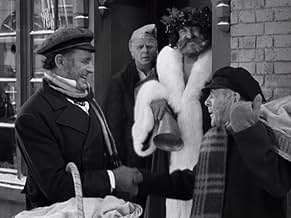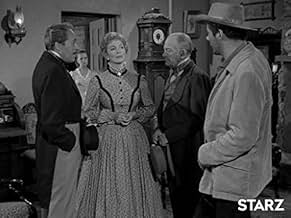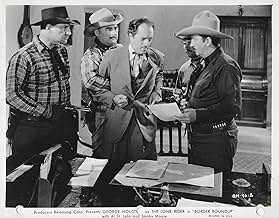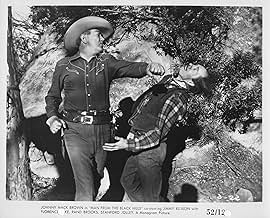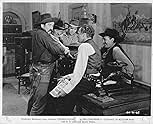I. Stanford Jolley(1900-1978)
- Actor
- Additional Crew
Perennial film western heavy I. Stanford Jolley could be spotted
anywhere and everywhere in dusty "B" fare from 1935 on. Often
mustachioed, this freelancing, wideset-eyed, black-hatted villain, who
showed up in Hollywood following vaudeville and Broadway experience,
could be counted on to give the sagebrush hero a devil of a time
before the film's end.
Born on October 24, 1900, in Elizabeth, New Jersey, and raised in nearby Morristown, Jolley was nicknamed "Ike" (short for his given name "Isaac") by his parents but "Stan" by his friends. Of French and English descent, his entertainment-minded father, Robert B. Jolley, at one time owned and operated a traveling circus and carnival before becoming a successful restaurateur and opening an electrical contracting service. Jolley worked at his father's electrical store following high school for a time but then drifted around for a few years while searching for a passionate direction in life.
Around the time he married Emily Hacker in 1921, he took an interest in performing and started in vaudeville for both the B.F. Keith and Marcus Loew circuits. He also performed on stage and in stock shows, which led to a role as a blind man on Broadway in "Humoresque" in 1926. His father's death interrupted his acting pursuits, and he returned home to New Jersey in 1929 in order to handle the family's business affairs when the Great Depression brought his father's company to virtual bankruptcy.
In 1935, Jolley took a chance and moved his family (which now included two children) out west in order to reignite his acting career. His raw, sunken-cheeked, cold-eyed features seemed ideal for westerns and he found initial work in the genre in extra parts, wherein he learned how to ride horses on the spot. Although one of his first bits was in the Bette Davis drama Front Page Woman (1935), it wasn't long before he was firmly entrenched in oaters, playing uncredited bits throughout the rest of the 1930s. Slowly but surely he transitioned to featured roles in the WWII era, playing a reliable adversary to such cowboy heroes as Ray Corrigan in Trail of the Silver Spurs (1941) and Boot Hill Bandits (1942); Tom Keene in Arizona Roundup (1942); George Houston in Border Roundup (1942) and Outlaws of Boulder Pass (1942); Robert Livingston in Death Rides the Plains (1943) and Wolves of the Range (1943); Russell Hayden in Frontier Law (1943); Buster Crabbe in the western serial Blazing Frontier (1943), The Kid Rides Again (1943), and Lightning Raiders (1945)_; Dave O'Brien in Return of the Rangers (1943) and Outlaw Roundup (1944); and Tex Ritter in Midnight Raiders (1944), Raiders of the Frontier (1944), and The Whispering Skull (1944).
Jolley's array of gunslingers, henchmen, and outlaws continued into the postwar years, but he wasn't completely confined to westerns. He also made appearances in The Private Lives of Elizabeth and Essex (1939) starring Errol Flynn and Bette Davis, The Ape (1940) with Boris Karloff (in which Jolley's little boy Stan Jolley appeared as an extra in a soda shop), Corregidor (1943) with Otto Kruger, the serial Batman (1943), Charlie Chan in the Chinese Cat (1944) with Sidney Toler, The Desert Hawk (1944) with Gilbert Roland, The Crimson Ghost (1946), the serials King of the Rocket Men (1949) and Captain Video: Master of the Stratosphere (1951), Joan of Arc (1948) with Ingrid Bergman, and Sands of Iwo Jima (1949) with John Wayne.
Come the 1950s, however, Jolley was almost completely confined in films and on TV to the western genre. On the small screen he became a familiar nemesis to "The Lone Ranger" and also played guest villain to "Annie Oakley," "Hopalong Cassidy, "The Cisco Kid," "Kit Carson," "Cheyenne" and "Daniel Boone". Jolley's baritone voice was also used on radio for such shows as The Lux Radio Theatre. He continued to act past age 70, including in his last film, Night of the Lepus (1972), directed partly by his son Stan Jolley, who also became an Oscar-nominated art director.
The heavy-smoking character actor was diagnosed with emphysema in his final years and died of the respiratory illness on December 6, 1978, at the Motion Picture and TV Hospital in Woodland Hills, California.
Born on October 24, 1900, in Elizabeth, New Jersey, and raised in nearby Morristown, Jolley was nicknamed "Ike" (short for his given name "Isaac") by his parents but "Stan" by his friends. Of French and English descent, his entertainment-minded father, Robert B. Jolley, at one time owned and operated a traveling circus and carnival before becoming a successful restaurateur and opening an electrical contracting service. Jolley worked at his father's electrical store following high school for a time but then drifted around for a few years while searching for a passionate direction in life.
Around the time he married Emily Hacker in 1921, he took an interest in performing and started in vaudeville for both the B.F. Keith and Marcus Loew circuits. He also performed on stage and in stock shows, which led to a role as a blind man on Broadway in "Humoresque" in 1926. His father's death interrupted his acting pursuits, and he returned home to New Jersey in 1929 in order to handle the family's business affairs when the Great Depression brought his father's company to virtual bankruptcy.
In 1935, Jolley took a chance and moved his family (which now included two children) out west in order to reignite his acting career. His raw, sunken-cheeked, cold-eyed features seemed ideal for westerns and he found initial work in the genre in extra parts, wherein he learned how to ride horses on the spot. Although one of his first bits was in the Bette Davis drama Front Page Woman (1935), it wasn't long before he was firmly entrenched in oaters, playing uncredited bits throughout the rest of the 1930s. Slowly but surely he transitioned to featured roles in the WWII era, playing a reliable adversary to such cowboy heroes as Ray Corrigan in Trail of the Silver Spurs (1941) and Boot Hill Bandits (1942); Tom Keene in Arizona Roundup (1942); George Houston in Border Roundup (1942) and Outlaws of Boulder Pass (1942); Robert Livingston in Death Rides the Plains (1943) and Wolves of the Range (1943); Russell Hayden in Frontier Law (1943); Buster Crabbe in the western serial Blazing Frontier (1943), The Kid Rides Again (1943), and Lightning Raiders (1945)_; Dave O'Brien in Return of the Rangers (1943) and Outlaw Roundup (1944); and Tex Ritter in Midnight Raiders (1944), Raiders of the Frontier (1944), and The Whispering Skull (1944).
Jolley's array of gunslingers, henchmen, and outlaws continued into the postwar years, but he wasn't completely confined to westerns. He also made appearances in The Private Lives of Elizabeth and Essex (1939) starring Errol Flynn and Bette Davis, The Ape (1940) with Boris Karloff (in which Jolley's little boy Stan Jolley appeared as an extra in a soda shop), Corregidor (1943) with Otto Kruger, the serial Batman (1943), Charlie Chan in the Chinese Cat (1944) with Sidney Toler, The Desert Hawk (1944) with Gilbert Roland, The Crimson Ghost (1946), the serials King of the Rocket Men (1949) and Captain Video: Master of the Stratosphere (1951), Joan of Arc (1948) with Ingrid Bergman, and Sands of Iwo Jima (1949) with John Wayne.
Come the 1950s, however, Jolley was almost completely confined in films and on TV to the western genre. On the small screen he became a familiar nemesis to "The Lone Ranger" and also played guest villain to "Annie Oakley," "Hopalong Cassidy, "The Cisco Kid," "Kit Carson," "Cheyenne" and "Daniel Boone". Jolley's baritone voice was also used on radio for such shows as The Lux Radio Theatre. He continued to act past age 70, including in his last film, Night of the Lepus (1972), directed partly by his son Stan Jolley, who also became an Oscar-nominated art director.
The heavy-smoking character actor was diagnosed with emphysema in his final years and died of the respiratory illness on December 6, 1978, at the Motion Picture and TV Hospital in Woodland Hills, California.

